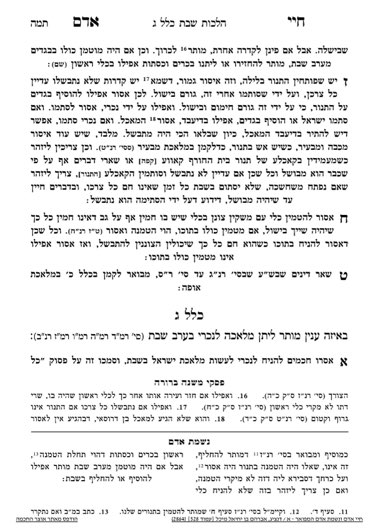We are beginning siman 7, where the Chayei Adam will discuss a practical application of hatmana regarding an oven. Although the application does not apply to us, because our ovens are made differently, there are important points we will extrapolate from the case.
The Chayei Adam writes that people would store food in their oven from before Shabbos in order to keep it warm for Friday night. Doing so is not inherently a problem, as we have discussed (S0050), because the oven walls do not touch the food.
After taking out food on Friday night, they would seal the oven again, in order to keep the remaining food warm for Shabbos morning. The Chayei Adam writes that this is assur. He explains that we are concerned that one of the foods may not be fully cooked, and by sealing the oven they may be facilitating cooking. It is important to note that issur here is not the issur derabanan of hatmana, but the issur deoraysa of bishul.
This concept can apply to a modern oven as well. If a person wishes to keep food warm in their oven from before Shabbos, some of it for Friday night and some for Shabbos morning, they must be fully confident that all of the foods in the oven are fully cooked before re-closing the oven door on Friday night, as otherwise they may be aiding in the bishul process.
The Chayei Adam continues, and writes that adding insulation to an oven already in a state of hatmana will also be a problem of bishul, because the additional insulation aids the bishul process. Additionally, it is assur to ask a non-Jew to close the oven door or to add insulation. We have learned (S0046) that amira l’akum is muttar for a psik raisha (even when the ensuing melacha is inevitable). Arguably, asking the non-Jew to shut the oven should be the primary request of the Jew, and the fact that the non-Jew has facilitated cooking should be a secondary outcome. However, the Chayei Adam writes that this thought process is incorrect, since the primary purpose of shutting the oven is to take care of the food, as needed.
The Chayei Adam continues, and writes that if the food was not fully cooked before Shabbos, and a Jew closes the oven and facilitates bishul, the food is assur even bedieved. If the food reached maachal ben derusai beforehand, bedieved, it will not be assur. If the food did not reach maachal ben derusai but a Jew asked a non-Jew to close the oven, there is an argument that the food will be muttar bedieved.
If there are coals in the oven, when the oven is sealed, there is very little air in the oven so the coals die down. When the oven is open, it fans the coals. This creates a potential maavir problem when opening the oven and mechabeh problem when closing the oven. This issue does not apply to our modern day ovens.
Practically, if a person wishes to keep food warm in their oven from before Shabbos, some of it for Friday night and some for Shabbos morning, they must be fully confident that all of the foods in the oven are fully cooked before re-closing the oven door on Friday night. Otherwise, they should take out all of the food in the oven at one time.
If a person has, for example, cholent in the oven which they wish to leave for the following day, it must be fully cooked, as we have learned above. Lechatchilla, it must be cooked to the point that one would be willing to serve it to guests. The fact that it is mitztameik veyafeh lo, improving by remaining in the oven overnight, does not prohibit re-closing the door on Friday night. However, if it is only at the level of maachal ben derusai, and by shutting the oven door, it will improve to be served to guests, it is assur to re-close the door on Friday night.
Summary
- If a person wishes to keep food warm in their oven from before Shabbos, some of it for Friday night and some for Shabbos morning, they must be fully confident that all of the foods in the oven are fully cooked before re-closing the oven door on Friday night. Otherwise, when re-closing the oven, they are performing bishul.
- Similarly, one may not add insulation to an oven already in a state of hatmana.
- One can not ask a non-Jew to perform either of the above tasks.
- If one transgressed these issurim, if the food was cooked to the level of maachal ben derusai, it is muttar; otherwise, it is assur.



